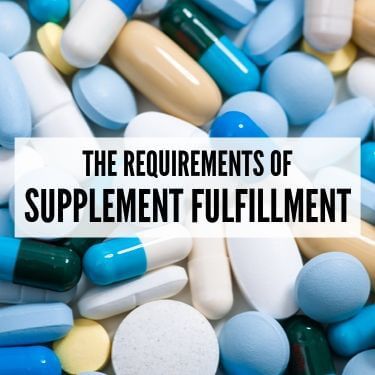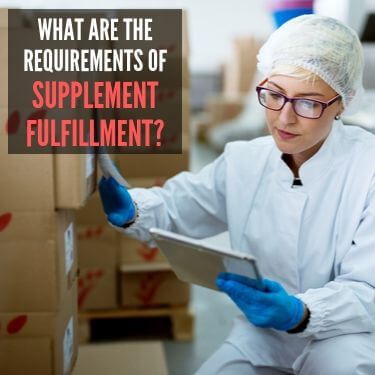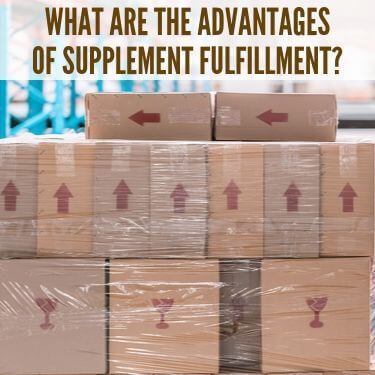
 Copy URL to Clipboard
Copy URL to Clipboard
Is your company abreast of growing trends in customer ordering behavior, such as supplement fulfillment? If you’ve never heard of supplement fulfillment, here’s a quick definition. It’s when a logistics company ships out vitamins, nutraceuticals and even some cosmetics to customers. Doing so is referred to as supplement fulfillment services. These services are a little different from the usual packing and shipping your employees usually do. This is because of the sensitive expiration dates of many supplement products. To maintain customer satisfaction, you want to learn as much as possible about all forms of supplement fulfillment, including nutraceutical fulfillment. In this article, we’ll dive deeper into the definition of supplement fulfillment. We will also discuss all the various supplements that encompass this area of logistics. Finally, we’ll explain the requirements and advantages of a supplement fulfillment center.
Table of Contents

Supplement fulfillment services are those that deal in receiving supplement orders, fulfilling those orders, and then shipping them out to customers. As we mentioned in the intro, supplements often have expiration dates, much the same way food does. That means shipping the orders out quickly is a top priority. Just like you can’t ship out expired food to customers, the same is true of supplement products. Your company may have clients that sell food items, so you’re already acquainted with shipping time-sensitive orders. Supplement fulfillment is a different animal. That’s why it’s often classified as its own fulfillment category. Not only is speed important, but so too is accuracy. Whether a customer orders a single supplement or several packs, all orders must be grouped together correctly. Then they’re shipped to the customer’s door. Mistaking one product for another is detrimental to customer satisfaction and to your logistic company’s reputation. Even if you don’t yet work with any companies that ship supplements, chances are, you will sooner than later. According to a February 2019 article from Rakuten Intelligence, supplement and vitamin sales are way up. From 2018 to 2019, sales jumped 40 percent.
Not only that, but dietary supplements and vitamins tend to outsell a lot of products online. These include fitness and exercise equipment, snack foods, diapers, haircare, and clothing. The diagram below shows this in more detail.
Why are more and more people buying their vitamins and supplements online rather than at grocery stores or pharmacies? It could be due to convenience. It only takes a few clicks to order supplements online. Compare that to getting in the car, driving, going to the store, and then coming back. Ordering online takes much less effort.
While customers tend to have to wait for their product after placing an online order, with fast shipping, products can arrive 48 hours after ordering. Sometimes it’s even 24 hours.
Another reason that could be driving this online abundance of supplement orders is product availability. While grocers and pharmacies stock a lot of products, if a customer is looking for a specialty supplement, they might be out of luck. Driving from store to store hoping to find said vitamin or supplement is time-consuming. It’s much simpler to go online and order the product there.
Why the focus on supplements all of a sudden? According to health brand conversion company Creative Thirst, it seems that today’s consumers have an increased focus on improving their health. Per Creative Thirst, here’s a breakdown of why most people said they took supplements:
No matter the reasons people are turning to supplements, the data is clear. More and more customers are ordering their vitamins and related product online. That means it’s important for logistics companies to have a supplement fulfillment process in order if they don’t already.
Which Supplements Are Considered Part of This Fulfillment?
We’ve touched on vitamins, but what other products would be considered supplements? In this section, we’ll go in-depth and discuss each product type.
Energy drinks and bars are two supplements you might ship to your customers. The National Center for Complementary and Integrative Health or NIH notes that energy drinks are the second biggest-selling dietary supplement in the United States for male teens and adults. These drinks are behind only multivitamins.
Then there are energy bars, which are intended for everyday, on-the-go snacking. Brands include Perfect Bar & Company, Kind, LARABAR, and PROBAR. Energy bars provide nutrients, stave off hunger pangs, and boost energy.
Most customers who order energy bars will likely buy them in cases or packs rather than single bars. The same is true of energy drinks. Having a means of shipping these bulk items is imperative for the success of a logistics company’s supplement fulfillment center.

As we mentioned in the intro, some cosmetic products do count as supplements. These are typically pills or vitamins the customer consumes. Sometimes they’re topical products as well.
People aren’t the only ones getting in on the supplement craze. They may buy vitamins and treatments for their pets as well. For example, there are supplements formulated for young puppies and kittens as well as senior pets. Other options for pets include:
The effects of these pet supplements vary. SAM-e can be used for arthritis and liver damage in dogs and cats. It’s often administered in conjunction with milk thistle. SAM-e even helps us people, potentially reducing arthritis and depression symptoms.
Fish oil can alleviate the pain and discomfort of pet skin allergies. There’s even a belief that glucosamine may lessen arthritis symptoms in pets.
Herbal supplement fulfillment deals with herbal compounds. These are natural treatments that utilize whole plants for better health. Herbal medicine compounds can include compresses, ointments, capsules, pills, syrups, teas, and tinctures.
Sometimes multiple herbs are used. This is a practice known as polypharmacy. Even modern medications once had herbal ingredients as their bases. Poppy was used for morphine, cinchona bark for quinine, foxglove for digoxin, and willow bark for aspirin.
Those with celiac disease, must choose gluten-free food and supplements. Celiac disease starts in the immune system. When a person with this disease consumes gluten, they experience symptoms like diarrhea and other discomfort. The worst part of celiac disease is that gluten can cause small intestine damage.
Gluten-free products do not have any barley, rye, or wheat proteins. If a customer has a gluten allergy and orders a gluten-free supplement, shipping them the right product is incredibly important.
Your logistics company’s dietary supplement fulfillment center might ship products for bodybuilders. There are many supplements a budding bodybuilder might take, such as:
From Vitamins A through D, multivitamins, and everything in between, vitamins are another top-selling product in supplement fulfillment.
There are vitamins that can help with all the following and more:
Finally, there’s nutraceuticals. This term is a combination of the words “nutrient” and “pharmaceutical.” They include herbals, minerals, vitamins, fortified dairy, dietary supplements, antioxidants, and more.
There are both nutraceutical foods and nutraceutical supplements. In the US, laws don’t dictate what constitutes a nutraceutical.

Supplement fulfillment companies and centers must follow the standards established by the Food & Drug Administration or FDA. In particularly, they must be compliant with the Current Good Manufacturing Practice or cGMP.
The cGMP rules ensure that all supplements that are produced and shipped out to customers meet a certain level of quality and safety. The requirements a company must follow to achieve compliance of cGMP rules are as follows:
The purpose of these regulations is to reduce the chances of supplement error, deviations, and contamination. This is something no company wants for its customers anyway.
If your logistics company isn’t using the most recent technologies, you might not be in compliance with cGMP rules. All tech, equipment, and systems must be no older than 20 years. You must also ensure any clients you work for are careful with the labeling of their products. If a product says a certain ingredient serves a specific benefit but that ingredient isn’t the active one, then you’re not in compliance. That could lead to a supplement recall.
In severe cases, the FDA could call for an injunction or seizure case against the supplement in question. This is where the court gets involved to prevent further lack of compliance with cGMP regulations. The goal is to get the company to do further product testing, work on cleaning up their labs, and get new testing equipment.
If worst comes to worst, it’s possible to receive a criminal charge for lack of compliance. This could lead to time in prison and/or significant fines.
The retailers you work with with may already be registered with the FDA. According to the FDA themselves, almost all drug companies that relabel, repack, or produce drugs, including supplements, can become registered. Cosmetics brands will have to go through the FDA’s Voluntary Cosmetic Registration Program, or VCRP.
While these registrations are necessary, they’re not enough. All your clients must also be in compliance with cGMP rules. Your logistics company should do whatever it takes to be compliant as well.

Throughout this article, we’ve explained what supplement fulfillment is, which supplements you might ship to customers, and how to stay in compliance with FDA regulations. If you’re still not sure if supplement fulfillment is a service your logistics company should offer, this is the section for you. In it, we’ll go over the advantages of supplement fulfillment.
The first reason you might want to consider adding a supplement fulfillment center to your services has to do with expanding your clientele. Logistics companies are always seeking new retailers and clients to partner with. This grows the company and boosts revenue.
If you partner with a large retailer that ships both edible and nonedible products, you’re limiting your revenue stream if you only accept nonedible orders. By offering supplement fulfillment services, you can take on more clients and thus more work.
As we discussed earlier in this article, online supplement orders have increased in the past few years. That doesn’t seem like it will be changing anytime soon. More and more logistics companies are probably going to begin shipping supplements to get in on a growing trend.
You want your company to stand out from the pack, right? By doing supplement fulfillment now before it’s so commonplace, more clients and retailers will be interested in working with you.
While the last two benefits were all about your logistics company, this one is for the customers. Today’s online shoppers have certain expectations when they complete an order. They expect they’ll get what they paid for, no substitutions or imitations. They also expect the product will arrive quickly and be packed safely so it’s ready to use.
Through a supplement fulfillment center that deals exclusively with these orders, safe shipping can become a guarantee. Staff will be trained on how to handle incoming orders and how to safely pack supplements so the product won’t be damaged in shipping.
Not only that, but at a supplement fulfillment center, all employees should learn how to decipher labels and expiration dates. The staff at these centers know to never ship a supplement past its expiration date for the safety of the customer. If a label is ripped, torn, or smudged, the item might be withheld until more clarification can be gained. This is again for a customer’s safety. It also helps to stay aligned with the cGMP rules.
In fact, learning, mastering, and staying on top of those rules should be a priority of a logistics company as much as it is a supplements manufacturer. When both companies work in tandem to prioritize safe shipping, everyone wins, including the customer.
While the rules and requirements of a supplement fulfillment center are somewhat more taxing than shipping non-edible items, it’s worth it to comply. This way, your logistics company can grow its client base and maintain happy customers.
If you’ve avoided supplement fulfillment until this point, it’s better to get on this growing trend now. Logistics providers can handle many services, including pick and pack fulfillment services. It will be expected of your company at some point by your clients as more and more people buy their vitamins online. The sooner you learn the FDA’s cGMP regulations and other requirements, the faster you can ensure your logistics company is in compliance. R + L Global Logistics' fulfillment and distribution services make for a great choice if you want trustworthy supplement fulfillment and shipping. Our warehouse throughput expiring product fulfillment is a top-tier service of ours. From edible food items to supplements, we have established an exemplary warehouse throughput tracking system to prevent item expiry and wasted money.
